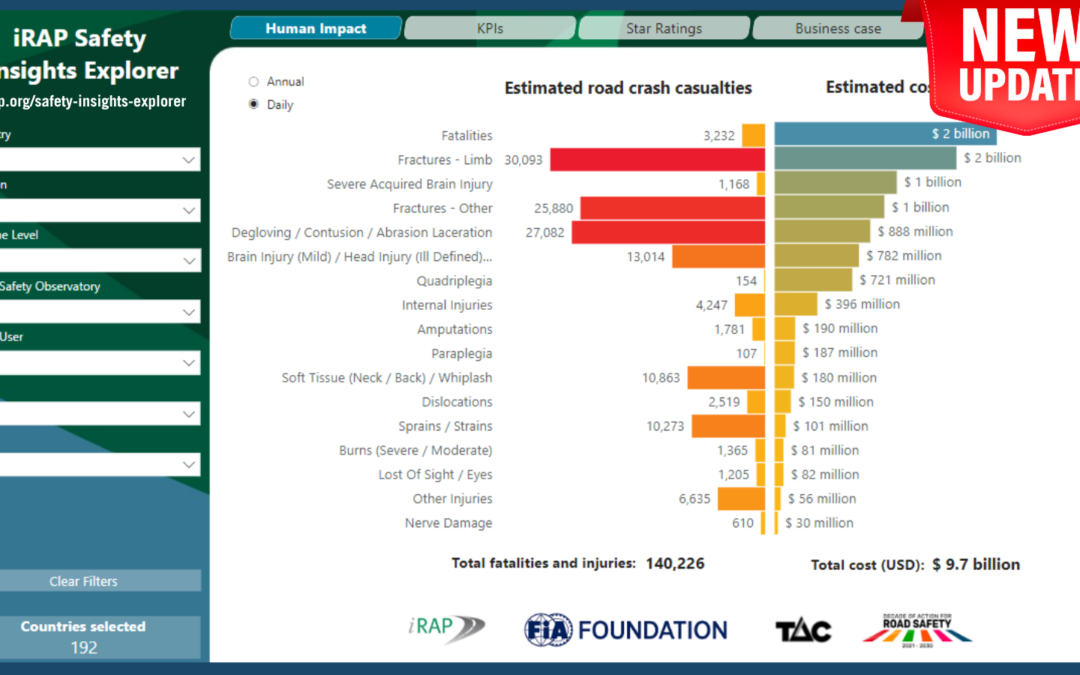New data has been unveiled in iRAP’s Safety Insights Explorer, a critical datahub for decision-makers and partners worldwide seeking to understand the true extent of road trauma, the safety of the world’s roads, and the positive impact that can be made with targeted investment.
The Safety Insights Explorer helps to explain why road crashes remain a leading cause of death and injury in countries and worldwide, drawing from data that has been collected using the iRAP methodology by partners across nearly 600,000km of roads in more than 80 countries.
The updated Insights estimates that road death and injuries around the world cost US $3.6 trillion annually, equivalent to more than 3% of global GDP. Road deaths are estimated to cost $753 billion annually, followed by limb fractures costing $ 616 billion and severe acquired brain injury costing $414 billion.
Greg Smith, Global Programme Director at iRAP said, “We are now halfway through the Decade of Action for Road Safety 2021-2030, with the global goal of halving road deaths and serious injuries by 2030.
“As countries prepare for the 4th Global Ministerial Conference on Road Safety in Morocco next year, this free tool is a must-have reference to inform evidence-based action to 2030,” Mr Smith said.
Thanks to the support of FIA Foundation and Australia’s Transport Accident Commission (TAC), latest additions to the Safety Insights Explorer include:
- Updated fatality and injury estimates referencing the Updated World Health Organisation (WHO) Global Status Report on Road Safety and Institute for Health Metrics and Evaluation (IHME) Global Burden of Disease study.
- Expanded iRAP Star Ratings and infrastructure Key Performance Indicators (KPI), informed by an additional 100,000km of assessments by partners worldwide.
- Updated and new filters enabling, for example, fatality and injury estimates to be filtered by road user type.
- Updates to the Business Case for Safer Roads analysis for each country, including costs of all injury types and estimates of investment required as a percentage of current road investment.
A key feature of the Insights Explorer is that it provides estimates of the costs of fatalities and injuries by injury type, road user, age and sex. This unique analysis is made possible thanks to technical collaboration with the TAC, a no-fault road trauma injury insurer in Victoria, Australia. TAC road crash claims data show that more than half of all costs occur more than two years after a crash, buried deep within health and social welfare systems.
“Bringing the latest data together, and putting it freely in the hands of decision-makers and advocates, helps to support debate about the right scale of response to the enormous level of road trauma occurring every day,” Mr Smith said.
Governments, development banks, donors and the private sector each have a role to play in mobilising the sustainable investment needed to reduce road trauma, with far-reaching economic and social benefits.
“We know safer roads save lives,” Mr Smith said. “A recent study by Johns Hopkins University published in the respected journal PLOS One has verified that road safety infrastructure changes and safer speeds informed by the iRAP Methodology and tools have prevented almost 700,000 deaths and serious injuries since 2016.”
“There are few better investments than in safer roads and safe speeds,” he added.
Achieving UN Target 4 for the majority of travel to be on 3-star or better roads for all road users by 2030 stands to save more than 400,000 lives per year and nearly 330 million lives and serious injuries over the 20-year life of road treatments, with an economic benefit of US$986.7 billion to the global economy.
– Ends –
Media enquiries
Judy Williams, Global Programme and Communications Manager, iRAP
Email judy.williams@irap.org (based Brisbane)
About the Safety Insights Explorer
The iRAP Safety Insights Explorer has been produced by the global road safety charity, International Road Assessment Programme (iRAP), with the support of the Australian Transport Accident Commission and FIA Foundation. Informed by latest data, the free tool provides an understanding the true human and economic impact of road trauma, the safety of the world’s roads, and the positive impact that can be made with targeted investment. People can interact with the data and filter by country, region (e.g. WHO, UNICEF, Road Safety Observatory and EU) and country income level, road user type, injury victim age and sex, Land Use type, Rural/Urban area type, Vehicle Flow and Carriageway type.
https://irap.org/road-safety-insights/
About iRAP
iRAP is a registered charity with the vision for a world free of high-risk roads. The charity is active in over 125 countries and works with governments, development banks, mobility clubs, industry, research organisations and road safety NGOs to provide them with the free methodology, tools, systems and training and support to make their roads safer. iRAP’s Star Rating Methodology provides an objective measure of the level of safety which is ‘built-in’ to the road for vehicle occupants, motorcyclists, bicyclists and pedestrians. A 1-star road is the least safe and a 5-star road is the safest. iRAP and its partners have influenced the safety of over USD$101 billion dollars of infrastructure investment, has Star Rated over 1.8 million kms kilometres of roads and designs, plus 1,356 schools, Risk Mapped over 1.8 million kilometres, and trained 69,000 people globally. iRAP is the umbrella programme for regional road assessment programmes including ChinaRAP, AusRAP, usRAP, KiwiRAP, IndiaRAP, BrazilRAP and BrazilRAP Sao Paulo, South Africa RAP, ThaiRAP, TanRAP, MyRAP, United Kingdom RAP and KSARAP. The charity’s work is financially supported by the FIA Foundation, Aleatica Foundation, 3M and Prudence Foundation.
irap.org

















